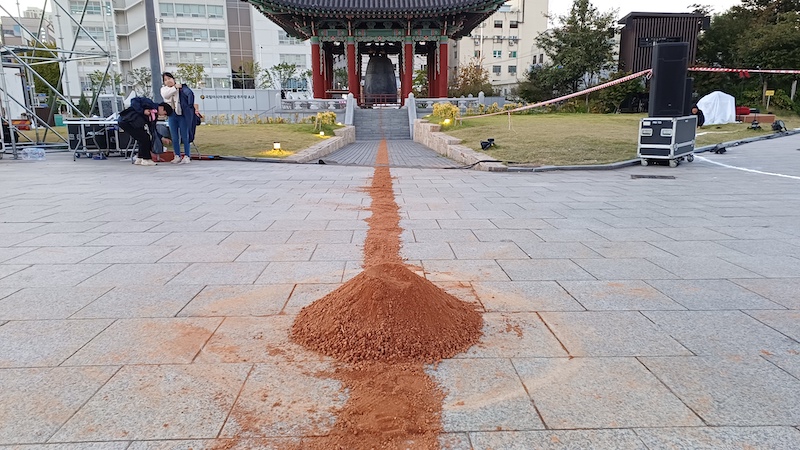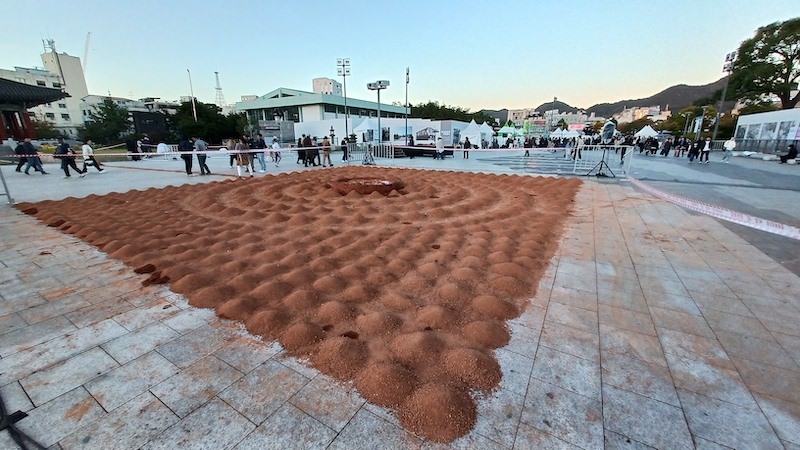Life’s a Beach and That’s Where Sand Belongs
By William Urbanski
The city of Gwangju has endured a number of difficult challenges and near catastrophes over the past couple of years. Covid-19 had a notable impact on the city, bringing most major gatherings and events to a near halt. It was only due to citizens’ acceptance of and compliance with government-mandated measures that the pandemic was not much worse. Then, in 2022, Gwangju fell victim to a dramatic water shortage which almost resulted in water restrictions. Luckily, that calamity was narrowly avoided, much more because of freakish rainfall last July, and not by, you know, addressing the underlying issues that caused the problem in the first place. In any case, a win is a win and once again, Gwangju avoided disaster by the skin of its teeth.
But alas, it would not be a calendar year if the city did not have to deal with at least one major crisis, and this time the pickle Gwangju has found itself in has nothing to do with viruses or weather anomalies but rather dollars and cents. Yes, Gwangju is facing a big-time budget crunch, meaning a lot of programs across the city are poised to be slashed. While the reasons for this financial fiasco are myriad and complex, one of the simplest and most actionable steps the city can take to correct its monetary position is to stop paying performance artists to dump piles of sand in the middle of the ACC.
Dumping Piles of Sand in the Middle of the ACC is Not Art
Full disclaimer: I do not hold a doctorate in art history. But what I can say is that, beyond any shadow of a doubt, pouring a bunch of sand all over the ground at the ACC has zero artistic value, is a waste of sand, and is also a waste of money.
Before I say anything further, I want to address the haters who are no doubt going to come after me with baseless and exaggerated claims that I am somehow “anti-sand” or that I do not like sand. In reality, nothing can be further from the truth! It turns out sand is a valuable resource and has a great many uses. In construction projects, for example, sand can be used in many ways, such as when laying bricks on the ground. Of course, this requires careful preparation of the sand, but that is a story for another day. Perhaps an even more common use of sand is in cold and icy places like Canada. Sand can be spread out over an icy road to increase traction and generally reduce its slipperiness quotient. In fact, there are entire fleets of specially designed trucks in Canada that exists for no purpose but to stay spread sand over icy roads and highways during the winter months! It stands to reason that to use sand properly, it should either be packed down tightly and evenly or spread thin over an icy surface (which is usually achieved by throwing it with a shovel or one of the above-mentioned sand-throwing trucks). One way sand is not meant to be used is to dump it in piles in the middle of the ACC for no reason.
Apparently, a couple of artists who participated in recent Fringe Festival activities did not get the memo about sand and decided that it would be a good idea to dump a great deal of the stuff right in the middle of the ACC Plaza on a Saturday. In addition, they made at least one big trail of sand that extended out to the pagoda / bell tower.
Dumping a bunch of sand in the middle of the ACC is rife with problems. For one, sand is actually quite heavy, so a big, smoky truck of some sort was probably needed to bring it there. Second, sand has this nasty characteristic of being small and sand-like, so it also probably took a great deal of effort to clean it up. All of this hard work could have been avoided by not dumping a bunch of sand on the ground at the ACC.
If the artists really wanted the citizens of Gwangju to experience the wonders of sand, it turns out there are places where sand exists naturally, and those places are called beaches. Perhaps filling a bus with people and driving them to a beach would have been a better use of taxpayer money. This would also have the benefit of allowing the people to spend a day at the beach and actually play with the sand instead of just looking at the big pile of sand dumped on the ground at the ACC.
While I was walking around the Fringe Festival, trying to comprehend why anyone in their right mind would want to dump a bunch of sand there, another group of artists caught my eye. It was confirmed that they were making giant circles and shapes on the ground by dumping bags of flour, which is food, on the ground. Generally speaking, after any food product touches the ground, it is no longer good to eat. While dumping sand on the ground for no reason is ridiculous, purposefully wasting food by dumping it on the ground and calling it art is completely asinine.

Won Woes
Everyone in the city is going to be affected by the financial belt-tightening that is going to play out in 2024. Fiduciary problems are complex, and the city will have to do some serious soul searching about what programs and services it wants to spend the big bucks funding. Hopefully, everyone can agree that money spent dumping sand and flour on the ground at the ACC is money better spent elsewhere.
The Author
William Urbanski is the managing editor of the Gwangju News. He likes his kimchi spicy and his beaches sandy.



